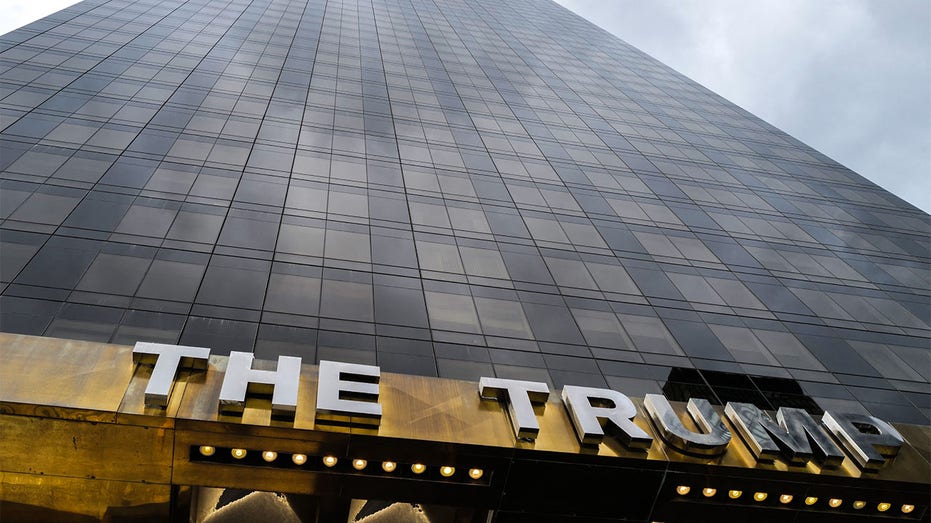Trump assets, including NYC tower, could be on the chopping block to pay massive $355M civil fraud ruling
Legal experts have called the ruling 'obscene,' and argued Trump has strong grounds for an appeal.
Show me no one is above the law because I'm not seeing that: Alina Habba
Trump attorney Alina Habba shares what's next for the former president after a judge ruled he must pay nearly $355 million in a New York civil fraud case on 'The Story.'
As a 30-day deadline looms for former President Donald Trump to fork over $355 million in a civil fraud trial, several of his multi-million assets could be on the chopping block to pay off the fine.
These assets would presumably include buildings owned by the Trump Organization such as the iconic Trump Tower, Trump Park Ave, 1290 Avenue of the Americas, 40 Wall Street, the Trump National Golf Club in Westchester, and the Seven Springs.
That the former president will sell any of these properties – taking a chunk out of his estimated $2.6 billion net worth – is merely speculative at this point. And legal experts have argued he has strong grounds for an appeal.

The "Trump World Tower", located on 845 United Nations Plaza, in New York City on February 17, 2024. ( CHARLY TRIBALLEAU/AFP via Getty Images / Getty Images)
"Even if we choose to appeal this – which we will – we have to post the bond, which is the full amount and some, and we will be prepared to do that," Trump lawyer Alina Habba told Martha MacCallum on Monday.
Trump could ultimately end up owing a half-billion dollars or more as a result of Friday's verdict. In addition to the $355 million penalty, Trump is required to pay interest on that amount.
In all, Judge Arthur Engoron imposed $363.9 million in penalties on Trump and his co-defendants, including his sons Eric and Donald Trump Jr., or about $464 million with interest, according to New York Attorney General Letitia James' office.
LOOMING LEGAL PENALTIES RAISE QUESTIONS ABOUT DONALD TRUMP'S FINANCES
"What they’re trying to do … is put him out of business. It’s not going to work, number one. Number two, what they’re doing is a scare tactic," Habba said. "It’s absolutely insane. No, there will be no mayhem for the Trump organization. Unfortunately, I know that was Miss James’ goal and Judge Engoron wanted, but that is not going to be the case."
George Washington University Law School professor and attorney Jonathan Turley has called the ruling "obscene" and accused Democrats of weaponizing the justice system to punish Trump, the presumptive GOP nominee in the 2024 presidential race.

Republican presidential candidate former President Donald Trump holds gold Trump sneakers at Sneaker Con Philadelphia, an event popular among sneaker collectors, in Philadelphia, Saturday, Feb. 17, 2024. (AP Photo/Manuel Balce Ceneta / AP Images)
Others have argued that the ruling would scare off investment in the Big Apple – a problem, FOX Business' Charles Payne noted, already existed before the ruling.
"You want office buildings built here? We've already got 52% capacity, that probably won't go much higher," he said. "You know people who don't have to come to the city to work, aren't going to come."
O’Leary Ventures Chairman Kevin O’Leary said he "would never invest in New York now."
"And I’m not the only person saying that," O’Leary said. "Do you think any foreign institution or any private equity firm or any pension fund would touch New York? No! And that’s why New Yorkers should be concerned."
TRUMP BARRED FROM OPERATING BUSINESS, ORDERED TO PAY OVER $350 MILLION IN NY CIVIL FRAUD CASE
Trump praised O’Leary for telling it like it is, warning that "businesses will flee NYC & State after the Corrupt Judge’s ruling!"
The former president himself has called Friday’s decision a "weaponization against a political opponent" and complained that he was being penalized for "having built a perfect company, great cash, great buildings, great everything."
For now, the former president can’t appeal the decision just quite yet because the clerk's office at Engoron's courthouse still has to file paperwork to make it official.

FILE: ustice Arthur Engoron presides over Donald Trump Jr.'s testimony in his family's civil fraud case at the New York State Supreme Court on Monday, Nov. 13, 2023 in New York. (Erin Schaff/The New York Times via AP / AP Newsroom)
Once that happens, Trump can file an appeal with New York's Appellate Division, a mid-level appeals court just above Engoron's trial court in the state's judicial hierarchy. His lawyers are almost certain to ask for an immediate stay — a legal term for an order halting enforcement of Engoron's decision while the appeals process plays out.
CLICK HERE TO GET THE FOX BUSINESS APP
Under state law, Trump will receive an automatic stay if he puts up money, assets or an appeal bond covering the amount he owes. The appeals process typically takes months, if not a year or more. If Trump is unsuccessful at the Appellate Division, he can ask the state's highest court, the Court of Appeals, to consider taking his case.
The Associated Press contributed to this report.





















